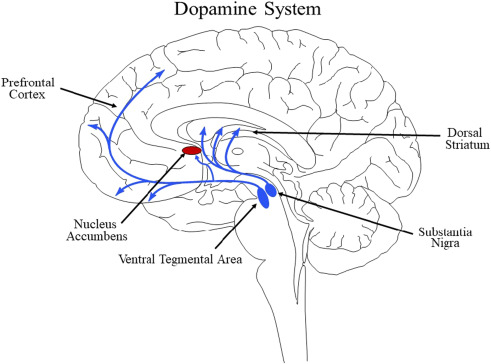
Moonpreneur
The mere thought of curling up on your couch with your favorite drink and going on a weekend movie binge kept you going during the stressful week at work. The sheer prospect calms you down and makes you feel lighter. Let’s explore dopamine fasting, pleasure, and ADHD.
How would you describe this experience?
It’s simple! Dopamine is the key player behind this phenomenon, as it plays a crucial role in our perception of pleasure. Dopamine impacts our learning, motivation, sleep, mood, and attention.
This is because Dopamine is synthesized in specific brain regions, including the substantia nigra, ventral tegmental area, and hypothalamus.

Source: ScienceDirect
Dopamine is a neurotransmitter that the nervous system utilizes as a chemical messenger to transmit signals between nerve cells.
While occasionally engaging in certain activities may not be harmful, concerns arise when these activities become addictions affecting attention, focus, and impulse control.
According to the National Library of Medicine, addiction is often associated with the repetitive, nonmedical use of drugs.
These addictive behaviors can be characterized by the specific brain processes they trigger, with most addictive substances leading to increased levels of Dopamine in the space between brain cells. The continuous release of Dopamine by neurons influences the motivation to respond to addiction-related stimuli, known as tonic or pacemaker firing.
Recommended Reading: 9 ADDICTIONS YOU MUST BREAK TO BECOME YOUR BEST SELF
Dr. Andrew D. Huberman, a Neuroscience Professor, describes Dopamine as a biological currency that influences human cravings for more, propelling us to explore, push boundaries, and seek new possibilities. It’s not just about feeling good; Dopamine is primarily responsible for motivating individuals to pursue something more significant.
What is dopamine fasting/dopamine detox?
This recent wellness fad in Silicon Valley involves abstaining from dopamine-producing activities for a certain amount of time to decrease reward sensitivity.
The concept is new. In 2019, Dr. Cameron Sepah, a psychiatrist based in California, introduced a novel concept called “dopamine fasting.” This practice aims to “reset your dopamine levels” by abstaining from activities or stimuli that bring pleasure, such as smartphone usage, social media, Netflix, and indulging in cheat meals.
While there is no scientific evidence to support this method, dopamine fasting has gained popularity as a sought-after wellness trend within a short span of time. Although it is widely understood that the human brain naturally produces Dopamine, making it impossible to completely “detox” from it, dopamine fasting aids in self-regulating behaviors.
Dopamine and ADHD
Attention deficit hyperactivity disorder (ADHD) symptoms usually appear in early childhood between 3 and 6 years of age, with the average age of diagnosis being around seven years old.

Source: Healthline
According to Healthline, approximately 6.1% of American children receive medication for ADHD treatment. Individuals with ADHD face significant challenges in resisting the temptation of the Internet and social media, which can be attributed to impulsivity, hyper-focus, and lousy time perception.
Recommended Reading: EXPLORING THE THEORY OF RESONANCE: A KID-FRIENDLY GUIDE
Can a digital detox help ADHD brains better manage addictive behaviors?
Research suggests that a complete dopamine detox, where a person successfully halts all brain dopamine activity, is impossible.
So, does Dopamine fasting work?
According to Kent Berridge, a psychology and neuroscience professor, taking a break from stimulating activities, known as dopamine fasting, won’t completely reset your brain’s dopamine system. At the same time, it may temporarily reduce the constant activation of Dopamine, and it won’t fully reset it.
Due to media misinterpretation, Dr. Sepah’s notion of dopamine fasting was clouded in controversy. Later, he stepped forward to end the discussion.
In his guide, Dr. Sepah emphasizes that dopamine fasting is not about avoiding Dopamine or anything stimulating, as reported in the media. It is unlike a silent meditation retreat where you cannot do anything or talk to anyone.
Moonpreneur is on a mission to disrupt traditional education and future-proof the next generation with holistic learning solutions. Its Innovator Program is building tomorrow’s workforce by training students in AI/ML, Robotics, Coding, IoT, and Apps, enabling entrepreneurship through experiential learning.

























